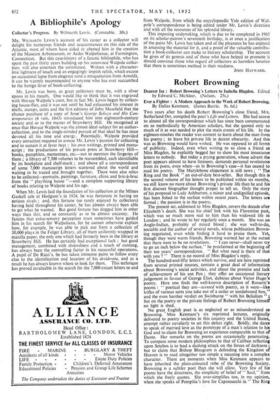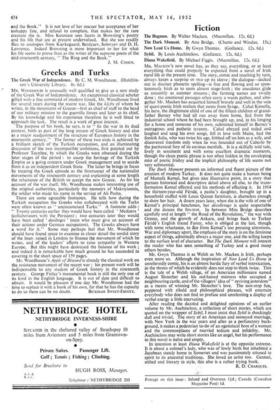Robert Browning
Dearest Isa : Robert Browning's Letters to Isabella Blagden. Edited . by Edward C. McAleer. (Nelson. 25s.) Ever a Fighter : A Modern Approach to the Work of Robert Browning. By Dallas Kenmare. (James Barrie. 9s. 6d.)
Two years after his death Robert Browning's close friend, Mrs. Sutherland Orr, compiled the poet's Life and Letters. She had access to almost all the correspondence which has since been commentated on so methodically by American scholars, but she quoted only so much of it as was needed to plot the main events of his life. In the eighteen-nineties the reader was content to learn about the man from his poetry ; to leave his private life in decent obscurity. And this was as Browning would have wished. He was opposed to all forms of publicity. Indeed, even when writing to so close a friend as Miss Blagden, he explicitly begged her to show his most innocuous letters to nobody. But today a prying generation, whose advent the poet appears almost to have foreseen, demands personal revelations from its poets, even when—as in Browning's case—it has ceased to read his poetry. The Marylebone elopement is still news ; " The Ring and the Book "an out-of-date best-seller. But though this is the second volume of his letters to be published within six months, we still know no more about Browning's private life than he and his first discreet biographer thought proper to tell us. Only the story of his proposal to Lady Ashburton, a minor and undignified episode, has been fished to the surface within recent years. The letters are formal ; the passion is in the poetry.
The present set, addressed to Miss Blagden, covers the decade after Elizabeth's death. She was his chief link with his Florentine past, which was so much more real to him than his widowed life in London ; and he wrote to her regularly once a month. She was an Anglo-Indian, probably of mixed blood ; she was well-to-do, sociable and the author of several novels, whose publication Brown- ing negotiated, even while finding it hard to praise them. Yet, though they were warm friends, Browning warned her at the outset that there were to be no revelations. " I can never—shall never try to go an inch below the surface," he proclaimed at the beginning of their ten years' correspondence. " But what need is there of that with you ? " There is no record of Miss Blagden's reply. The hundred-and-fifty letters which survive, and are here reprinted from several printed sources, contain a great deal of information about Browning's social activities, and about the promise and lack of achievement of his son Pen ; they offer an occasional literary judgement in favour of George Eliot, dubious about Victor Hugo's poetry. Here one finds the well-known description of Rossetti's poems : "poetical they are—scented with poetry, as it were—like trifles of various sorts you take out of a cedar or sandalwood box," and the even harsher verdict on Swinburne " with his Belialism " ; but on the poetry or the private feelings of Robert Browning himself no light is shed. No great English poet is as neglected or as misunderstood as Browning. ' Miss Kenmare's six reprinted lectures, originally delivered to poetry societies in this country and the United States, attempt rather cavalierly to set this defect right. Boldly, she dares to speak of married love as the prototype of a man's relation to his God and to claim for Browning an experience comparable to that of Dante. Her remarks on the poems are occasionally penetrating. To compare some modern philosophies to that of Caliban reflecting upon Setebos is to lead a dashing attack on the forces of darkness ; but to claim that Bishop Blougram is defending the Kingdom of Heaven is to read altogether too simple a meaning into a complex character. There are moments when Miss Kenmare appears to have inherited the plain-coloured robe of the Browning Society. Browning is a subtler poet than she will allow. Very few of his poems have the directness, the simplicity of belief of" Saul," from which she freely quotes. She over-simplifies too, in my opinion, when she speaks of Pompilia's love for Caponsacchi in" The Ring and the Book." It is not love of her rescuer but acceptance of her unhappy fate, and refusal to complain, that makes her the rare creature she is. Miss Kenmare sees facets in Browning's poetry and his life that are at present undervdlued. But she too readily flies to analogies from Kierkegaard, Berdyaev, Solovyev and D. H. Lawrence. Indeed Browning is more important to her for what his life seems to prove than as the writer of the supreme poem of the mid-nineteenth century, "The Ring and the Book."
J. M. COHEN.



































 Previous page
Previous page